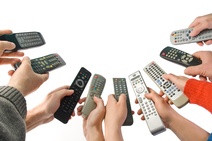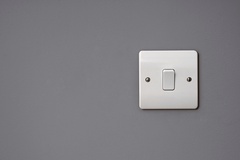Top 5 Current Technologies That IoT Will Kill Off (Bet you hadn’t thought of No.2)
As we accelerate towards a fully connected IoT world, let's pause for a moment to consider the poor old technologies that won't be around to see this beautifully integrated new world...
"Smart" - or more accurately: Connected - devices have been around for a while now. The Internet connection added to everyday devices has enabled limited increase in functionality, but has not been particularly disruptive. As we start to implement Truly Intelligent Buildings, all the interconnected devices and systems will add some real benefits to our lives, but will also render some currently commonplace devices obsolete.
Of course we don't want to gloat, since some of the items on the list have served us well for thousands of years. We should acknowledge the service they have given us, as we move on and embrace the benefits of the new IoT applications. Obviously this is not a comprehensive list. The world will change in a great many ways that we're not even aware of yet. However there are some things we can be fairly certain will be superseded in our insatiable quest towards modernisation.
1. Keys
One the first things likely to disappear from everyday life is the humble key. Key's have been around for thousands of years - since the ancient Egyptians and Babylonians - so as a technology they've survived much longer than most.
 As convenience triumphs over almost anything else nowadays, the thought of fumbling around for the right key will just become too troubling.
As convenience triumphs over almost anything else nowadays, the thought of fumbling around for the right key will just become too troubling.
Expect to have proximity sensors & biometric readers along with other IoT devices possibly in combination. These will simply and easily allow access as and when it is needed. Increased security will be one of the other benefits along with increased convenience.
Imagine walking up to your front door with a heavy package and it just opens. When tenants leave your rental property, you won't have to worry about any spare keys they may hang on to. These and many other practical applications will be managed through a simple intuitive interface.
2. Light Switches
Yup, this is probably the most surprising one on the list. Currently light switches perform a basic function. Simple "On" or "Off" (with the occasional dimming now and then). Simple and easy. However in the automated world of IoT and Truly Intelligent Buildings, this simply isn't enough. Sure, we may still have something that looks like a light switch on the wall, but it will be doing a whole lot more besides.
The humble light switch will metamorphose into something so much more useful and varied in function. The simple addition of electronics and edge compute capability will transform their capability. From air quality sensors, to thermostat control. From presence sensors to security alerts. The small anonymous plate on the wall will enable all kinds of 2 way communication. The many and varied applications are limited only by our imagination. Embedded interconnectivity enables practical applications of big data analytics with next to no effort. These additional functions will be easily added without the need for electricians or technicians. Anyone will be able to insert a new feature card or change the fascia for whatever application is needed.
Much like the mobile phones of today, the "light switches" of tomorrow are the enabling technology for IoT apps.
3. Mobile Phones
Strange as it may seem now, the days of ubiquitous mobile phone are definitely numbered. The all conquering technology of the last 2 decades is now nearing its peak. One could argue that the mobile phone has already died. It is certainly mobile, but the phone part is only one of the myriad of functions now performed. As many of these functions start to be integrated into other IoT devices, we can expect to see the all singing, all dancing mobile phone become oboslete.

We will be able to communicate more freely on whatever interface is available at any given time. For example, we will be able to automatically connect to a large screen in the office or seamlessly switch to a "watch" if we choose. As we move around our homes, from room to room we will be able to choose the appropriate screen/audio fixed/hand-held device. Since the data will be held elsewhere, the cost of the interface devices will decrease even as the ranges available and options increase.
4. Remote Controls
 TV, Air-conditioning, Bar-code Readers, Projectors, Music systems. etc.. There are a bunch of little infra red devices in all our homes and offices. All of them festooned with a different array of buttons, icons and logos. They've been around for years and have become a standard part of our lives. So why are all these going to suddenly disappear?
TV, Air-conditioning, Bar-code Readers, Projectors, Music systems. etc.. There are a bunch of little infra red devices in all our homes and offices. All of them festooned with a different array of buttons, icons and logos. They've been around for years and have become a standard part of our lives. So why are all these going to suddenly disappear?
Well, it's not because we're sick of having to buy batteries for them - although that would be reason enough in itself. The interface itself is somewhat limited. Surely it's easier to just say "Projector on" or "TV mute" or "Watch CNN" or "Reduce the temperature in this room by 3 degrees". With all devices connected and integrated automation as standard, all this will be common place. Superior technology will enable scanning of the entire contents of a shopping trolley without the need to unpack it all onto the checkout and back into trolley again. Can't wait for that!
All this will be achieved by advanced sensors integrated into Truly Intelligent Buildings.
5. Parking Meters
 The first parking meter was installed in Oklahoma City on July 16 1935 and since then millions have been installed all around the world. Just imagine how easy it will be when we park our car in the spot and car's ID is automatically synced with the space and we get charged only for the time the car stays there. No more messing around looking for change, or guessing how long we will need the space. Even better than that, we won't even need to use any of the pesky apps that have sprung up in recent years.
The first parking meter was installed in Oklahoma City on July 16 1935 and since then millions have been installed all around the world. Just imagine how easy it will be when we park our car in the spot and car's ID is automatically synced with the space and we get charged only for the time the car stays there. No more messing around looking for change, or guessing how long we will need the space. Even better than that, we won't even need to use any of the pesky apps that have sprung up in recent years.
Of course, all this assumes that municipal parking spaces will even be used at all. When we're all in driverless cars, won't we just send the car to park somewhere that's free and then just call it back when we're ready to leave?
What do you think of these technologies?
Will you be at all sad to see any of them go?
What other technologies do you think will disappear?
Maybe you disagree and think that we'll all be using keys for years to come. Please comment below, I'd love to know what you think.




